Every year, World Sustainability Day gives us all a friendly nudge from the planet — a reminder to pause and ask ourselves what we are doing to help her and whether we are living life harmoniously and sustainably.
For 2025, the day falls on October 29th, and the message feels more urgent than ever. Across the UK and beyond, communities, schools, and businesses are teaming up to create a cleaner, greener future. Change can feel tough sometimes, as there always seems to be an easier or quicker option than remembering reusable bags or sorting the recycling properly. Yet protecting the Earth always starts with me in small but meaningful ways.
Here’s how I stay motivated to make greener choices, why it matters, and some ideas that everyone and anyone can do, whether you’re already eco-savvy or just getting started. After all, if we don’t start now, it may already be too late.
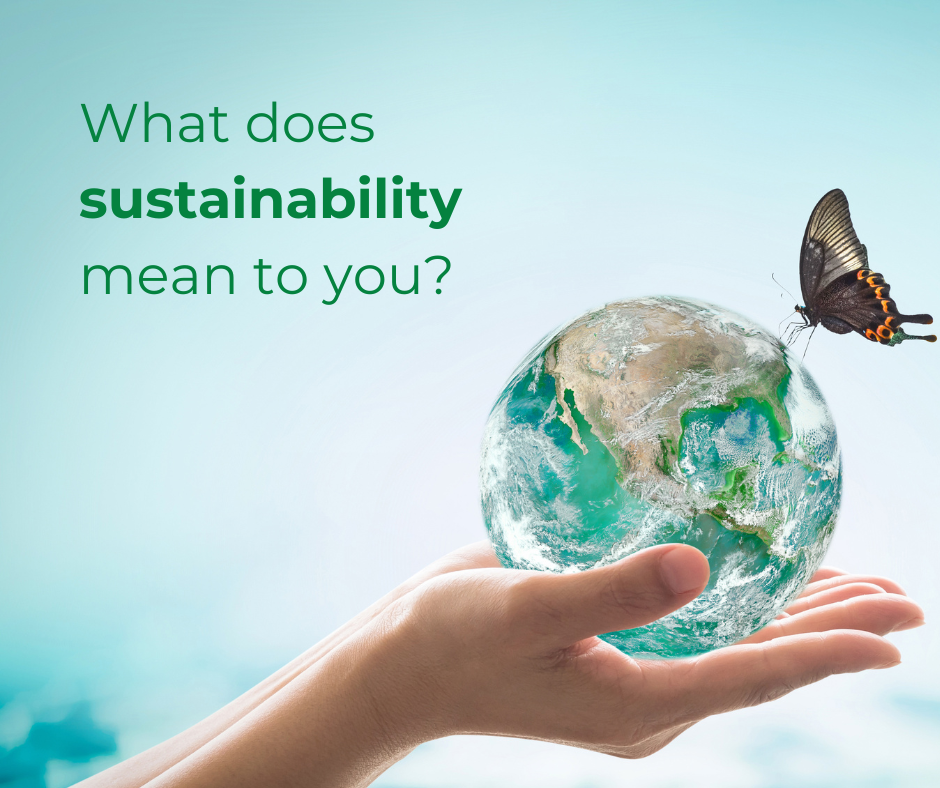
Why Celebrate World Sustainability Day?
World Sustainability Day falls on the fourth Wednesday in Octoberthe (29th October this year) and reminds us that small steps add up. The world’s resources are under growing pressure, and headlines about wildfires, melting ice caps, or rising sea levels can feel overwhelming. But there’s still hope.
According to the Department for Energy Security and Net Zero, the UK cut carbon emissions by nearly 44% between 1990 and 2022. Progress happens when people care and act, giving us proof that big change really does start small.
My own motivation isn’t just about fitting in with global numbers. For me, it’s more of a personal relationship with the planet and nature that drives me. I love spending time just walking through a park, watching the sea roll in or looking up at the stars at night. It connects me with something larger – Mother Earth (Gaia) and the universe to which I’m inextricably connected. And I want to do whatever I can to make that a better place.
Thinking about sustainability is also about connecting with my community and other people. I love seeing people in my town start community gardens, or local shops cutting back on unnecessary packaging. World Sustainability Day is a chance to look at what we could all do better and to try again, even if we slip sometimes. Of course, we all make mistakes, but we can put them right as soon as we can and avoid making them again in the future.
What World Sustainability Really Means — For the Planet and for People
Sustainability is about balance. It doesn’t mean living in a cave without ‘mod cons’ and eating nothing but berries! Although I’m not judging that lifestyle either, if that is what you choose.
Sustainability means meeting our needs today without destroying the ability of future generations to meet theirs. It’s about harmony between the Earth, its resources, and all who share them.
Carbon Footprints
Every choice we make has a carbon footprint, meaning the total amount of greenhouse gases produced by our actions, from the food we eat to the way we travel and the energy that powers our homes. According to UK government data, the average person in the UK emits around 10 tonnes of CO₂ each year — significantly higher than the global sustainable target of approximately 2 tonnes per person needed to slow climate change. Clearly, we need to keep reducing this.
Yet, sustainability isn’t only about carbon; it’s also about fairness. Around the world, billions of people still face poverty, hunger, or unsafe living conditions. Many countries that contribute the least to global emissions are already suffering the most from their effects: drought, flooding, food shortages, and displacement.
That’s why global efforts like the European Union’s Green Deal and the United Nations Sustainable Development Goals (SDGs) matter so much. The SDGs set out 17 interconnected goals, including things like clean energy, responsible consumption, the right to an education, safety for children, gender equality, and the reduction of inequality. Together, they remind us that caring for the planet means caring for people too.
Some people think the SDGs are only words – but that’s only true if you read them and do nothing! If you take action, then for you, and for the planet, they become a movement for change.
True sustainability is about creating systems that are socially fair, economically balanced, and environmentally sound. It’s as much about lifting others up as it is about cutting down waste. Whether it’s choosing ethical fashion, reducing energy use, or supporting fair-trade food, every action helps shape a world where people and the planet can both thrive.
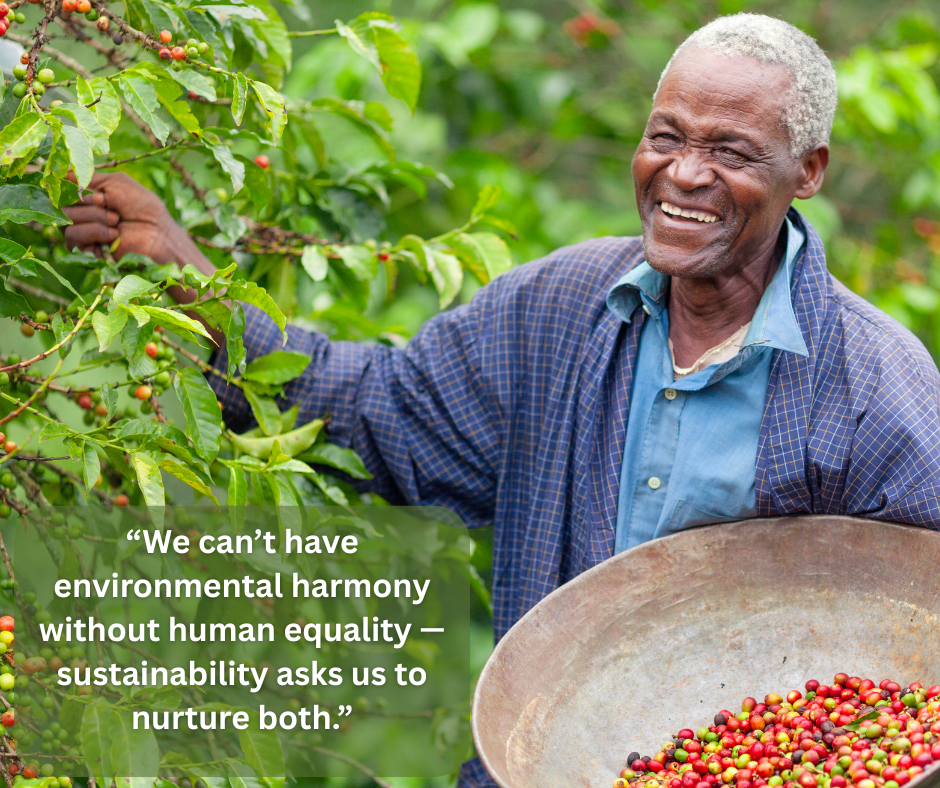
Understanding the Sustainability Basics
Sustainability might sound complicated, but to me it simply means using what I need without making life harder for the next person or the next generation. The original 3 Rs make sense here:
- Reduce: Use less water, energy, food, and single-use waste (plastics)
- Reuse: Bags, bottles, jars, and clothing all have plenty of life left in them
- Recycle: Check local guidance on bins and symbols, and recycle everything we can – it can be confusing, but with a little effort, we can do it
The UK produces around 222 million tonnes of waste each year, according to government data. If every family avoided just five plastic bags a week, that would save 7.5 billion bags annually, which is a mountain of plastic that wouldn’t end up in oceans or tangled in hedgerows.
How To Make Sustainable Choices Every Day
What I’ve come to realise is that sustainability isn’t about perfection since we all know that is impossible. But if I can make small, consistent progress, then I will be doing better, and that can only help. I cannot force multinational companies to use less carbon fuels, and I’m not about to ruin precious works of art to make a point. However, there are lots of things that I can do. Here are a few things that work for me:
- Reusable water bottle: I actually have a couple of these, and it’s one of the easiest swaps you can make. I can fill it with water, juice or squash to ring the changes too
- Tote bag on standby: There’s always one tucked in my bag, and I now have at least 6 supermarket bags in the car with me all the time. I don’t always remember to take them in, but if that’s the case, I put my shopping back in the trolley and pack it into the bags when I get to the car
- Walking, cycling, or public transport: This is not so easy for me because of where I live, but I like to offer lifts and share journeys where I can
- Switching off lights and unplugging at night: This can save you lots of money and doesn’t take a long time. Leaving things in standby is a drain on energy which you don’t need, and only turning things on when you really need them will cut your energy costs. According to the Energy Saving Trust, turning appliances off at the wall can save up to £55 per household per year
- Turn the heating down and put on a jumper: We all do this in our family – we all have thick dressing gowns, slippers and oodies, which are warm and snuggly, and so we can wear those and turn the heating down a notch or two, saving energy and money
- Recycling properly: Recycling is still one thing that we could all improve, and a quick visit to Recycle Now will give you lots of tips about how to recycle more. Many of us are still not recycling things like plastic spray bottles, yoghurt pots and toilet roll inserts, which should all go in the recycle bin. Many crisp packets can be recycled, but not at home, so I keep them in a small box, and next time I go to the supermarket, I can recycle them there
- Dispose of electronics safely: Many electrical items have precious metals or toxic materials that need to be recycled properly. You can read more on our post about International E-waste Day and how to do this
- Take batteries to your local recycling point: Batteries can leak toxic waste so they must never be put in household waste. Keep them in a jar/box and take them to the tip next time you go
- Shopping locally and seasonally: I love doing this. We stopped doing a large weekly shop a long time ago when we realised that we were not eating a lot of the food in time. Now we shop smaller but more often and try to use refillable options where possible. I have lots of glass jars that we refill with pasta, flour, rice, etc, from local shops. We are very lucky to have some local veg boxes and farm shops within a few miles, which help keep meals interesting – and of course, there are my own homegrown knobbly carrots!
- Composting: A small kitchen caddy keeps scraps from landfill and creates food for the soil. I also have a compost bin in my garden, which is great and saves lots of money on compost, as I also have lots of leaves to compost each year
- Make and renew clothes: This is something I have done since I was a child, and I’m pleased to say that my daughter has caught the bug and loves to cut up old clothes and make something new with them
- Growing my own food: This is something I love to do, and although I’m no ‘green-fingered goddess’, I do love pottering about in my garden and growing organic food
- Seed harvesting: This year, I have really got my act together and started to harvest seeds from my garden, not just food and flowers. This has been a huge learning curve, but I’ve loved every minute, and popping the seeds from snapdragon seed pods has become very therapeutic!
- Upcycle: This is one of my favourites because I love crafts and DIY. See our post about making Halloween decorations from recycled materials
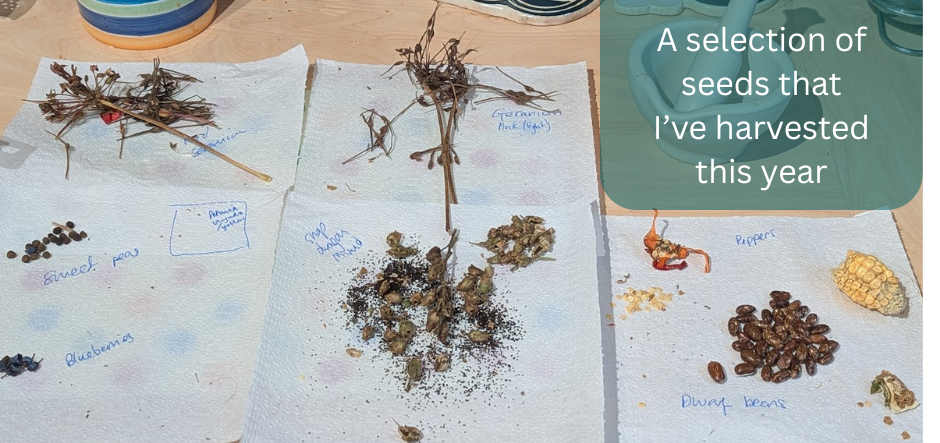
Overcoming Common Obstacles
Sustainability can feel challenging at times, but if you make small mindset shifts, things become easier.
Feeling Overwhelmed: If the list of eco-tips feels endless, just focus on one thing each week. My latest success is seed harvesting, and I can’t wait to see how many plants I can grow next year from what I’ve collected. Just doing one thing per week will make a difference – why not commit to switching off plugs at night?
Sceptical Friends and Family: Everyone has their own opinion, and that is right and proper. If you want to share your ideas, try to do it without preaching and allow people to make their own decisions. You cannot change them – you can only change yourself. But if you do that, maybe you will become an example they wish to follow.
Inconvenience: If I forget my reusable cup, I’m not going to beat myself up. I will simply try again next time. A reminder note by the front door/car often helps, and soon, things become a habit. We don’t want to give ourselves a guilt complex, but we do want to do the best we can.
Higher Costs: Some green products cost more upfront, but many save money in the long run.
Facing the Challenge of Fast Fashion
Fashion should be fun, but not at the expense of the planet or other people. The average UK shopper buys 26.7 kg of clothing a year, and about 350,000 tonnes of it ends up in landfill. This really is something that we can all address if we become more conscious about where our clothes come from, who is making them, and what we do with them once they are finished.
I try to:
- Buy second-hand – my daughters are always swapping clothes with friends, too
- Sell unwanted items on placed like Vinted – it raises a few additional pounds, and the items go to new, loving homes
- Repair small rips rather than replacing whole outfits
- Donate things to charity shops or a clothes bank
- Pause before buying anything new and think about whether I really need it
These small actions save money and give clothes a story instead of a shelf life.

Eating Sustainably
Food choices make a huge difference, and although I’m not a vegan or vegetarian, I don’t believe in making others feel guilty. But I do believe in making changes where I can.
According to the British Dietetic Association, swapping one meat meal a week for a vegetarian option saves the same carbon as driving 31 miles.
Here are some ideas to help with sustainable eating habits:
- Plan meals to cut waste
- Make a shopping list and only buy what you really need
- Support local farmers and producers
- Buy seasonal goods
- Try new plant-based recipes for variety and health
- Reduce portions slightly
- Use up leftovers by researching new cooking ideas online
Simple Ways Communities and Schools Get Involved
Individual action matters, but community energy multiplies the impact, so why not get your local school or community involved in a sustainability project?
Local schools now often host “walk to school” days and run lessons on saving energy. Community groups organise clothing swaps, river clean-ups, and shared gardens where neighbours grow food and friendship together.
Other easy ways to join in:
- Start or join litter picks
- Organise book or toy swaps
- Volunteer at a conservation event
These projects not only protect the planet but bring people together, and that can be the most sustainable energy source of all.
Quick Answers to Big Questions
Is it worth it if I’m the only one changing?
Yes! Small shifts spread faster than you’d think. Remember how we all used to get plastic bags with our shopping? Most of us do not do this now.
What can I recycle?
Most councils collect glass, paper, tins, and many plastics. If unsure, check Recycle Now for clear, local guidance.
Has anything improved because of Sustainability Day?
Definitely. If you want to see a more detailed analysis of things that are changing as we try to live more sustainably, see: https://energy.sustainability-directory.com/term/sustainable-practices-impact/.
Getting Started This Sustainability Day
If you want to begin somewhere, start small. Switch to a reusable coffee cup, walk to the shops, or join a local community event. You can find out more ideas at WRAP – The Global Environmental Action NGO.
Sustainable living isn’t about perfection; it’s about awareness. Each action, however tiny, ripples outward.
So this Sustainability Day 2025, choose one change that feels right for you. Compost in your garden, swap books with a friend, or pick up one piece of litter on your walk to work.
References
- Department for Energy Security and Net Zero. UK Carbon Emissions Data 1990–2022.
- Energy Saving Trust (2024). Home Energy Efficiency Tips.
- British Dietetic Association (2024). Sustainable Diets and Carbon Impact.
- Recycle Now (2024). Recycling Guidance for UK Households.

Related Posts
Conscious Living: How to tread lightly on the Earth
International E-waste Day 2025
Halloween Decorations from Recycled Materials

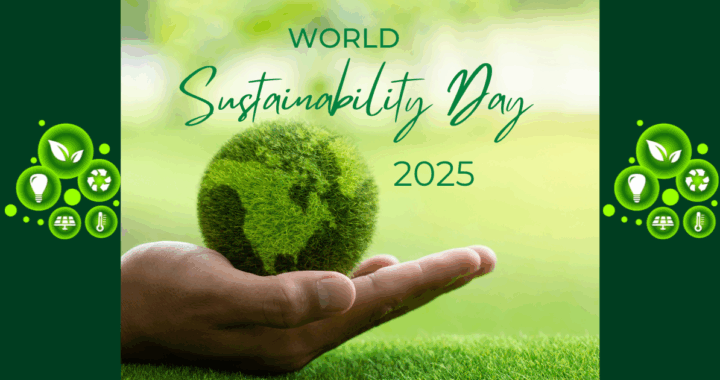
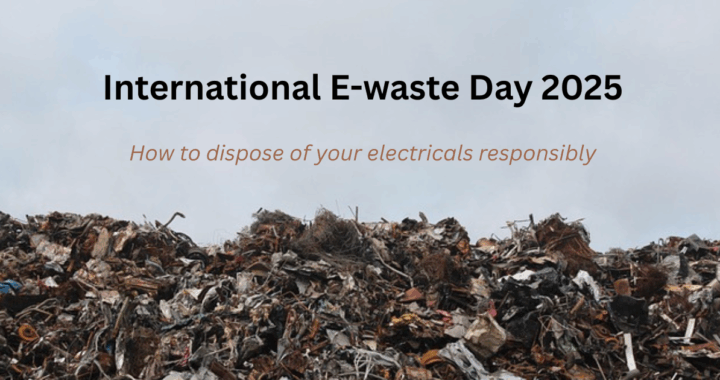

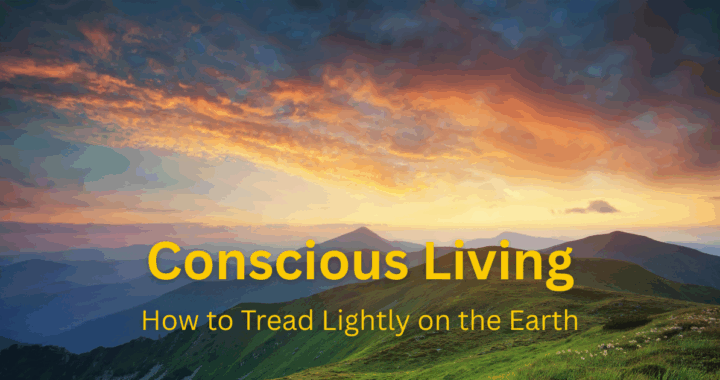
What a refreshing read, Gail. You’ve shown that sustainability isn’t just a scientific idea or government agenda; it’s a personal journey of responsibility. I love how you blend the global goals with your own habits like composting, seed harvesting, and upcycling; that’s the kind of storytelling that makes big issues relatable. It reminds me that progress begins with one small action repeated consistently, like planting one tree at a time until you have a forest.
Your thoughts on balance really stood out. In my part of the world, we still rely heavily on firewood and charcoal, not because we want to, but because other options are scarce or costly. Yet your message challenges me to think: how can developing regions pursue sustainability without leaving people behind economically? That’s a conversation worth having globally.
I also appreciate your humility in saying sustainability isn’t about perfection, it’s about awareness. That’s such a freeing truth. We might not all have electric cars or solar panels yet, but we can still live responsibly, love our planet, and lead by example. So here’s my question to you, Gail: if you could inspire just one new sustainable habit in every household this year, which would it be?
John
Hi John. Great to see you again and thank you for your kind and thoughtful comments. I agree that although governments can do a lot, much of what happens comes down to personal choices and personal responsibility. And that is something we can change.
Interesting that your part of the world still relies on firewood and charcoal. We did here in the UK for a long time, so we do need to have a respectful conversation with all part surrounding this and I agree that it is not fair for wealthier countries to say, “Well we stripped our environment bare, but we don’t want you too”. There needs to be a much more sustainable discussion that includes the people and their needs too. We just need to be mindful of all the aspects now and in my book, take a global responsiblity for everyone.
To answer your question, the sustainable habit I would cultivate more in my household would be to actually grow more of my own food. I’d love to have a small holding so that I could keep some chickens and grow much more food in say a polytunnel. That’s my dream!